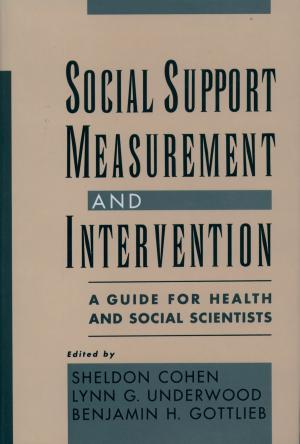The Young Spinoza
A Metaphysician in the Making
Nonfiction, Religion & Spirituality, Philosophy, Modern, Metaphysics| Author: | ISBN: | 9780199971688 | |
| Publisher: | Oxford University Press | Publication: | March 13, 2015 |
| Imprint: | Oxford University Press | Language: | English |
| Author: | |
| ISBN: | 9780199971688 |
| Publisher: | Oxford University Press |
| Publication: | March 13, 2015 |
| Imprint: | Oxford University Press |
| Language: | English |
Ex nihilo nihil fit. Philosophy, especially great philosophy, does not appear out of the blue. In the current volume, a team of top scholars-both up-and-coming and established-attempts to trace the philosophical development of one of the greatest philosophers of all time. Featuring twenty new essays and an introduction, it is the first attempt of its kind in English and its appearance coincides with the recent surge of interest in Spinoza in Anglo-American philosophy. Spinoza's fame-or notoriety-is due primarily to his posthumously published magnum opus, the Ethics, and, to a lesser extent, to the 1670 Theological-Political Treatise. Few readers take the time to study his early works carefully. If they do, they are likely to encounter some surprising claims, which often diverge from, or even utterly contradict, the doctrines of the Ethics. Consider just a few of these assertions: that God acts from absolute freedom of will, that God is a whole, that there are no modes in God, that extension is divisible and hence cannot be an attribute of God, and that the intellectual and corporeal substances are modes in relation to God. Yet, though these claims reveal some tension between the early works and the Ethics, there is also a clear continuity between them. Spinoza wrote the Ethics over a long period of time, which spanned most of his philosophical career. The dates of the early drafts of the Ethics seem to overlap with the assumed dates of the composition of the Treatise on the Emendation of the Intellect and the Short Treatise on God, Man, and His Well Being and precede the publication of Spinoza's 1663 book on Descartes' Principles of Philosophy. For this reason, a study of Spinoza's early works (and correspondence) can illuminate the nature of the problems Spinoza addresses in the Ethics, insofar as the views expressed in the early works help us reconstruct the development and genealogy of the Ethics. Indeed, if we keep in mind the common dictum "nothing comes from nothing"-which Spinoza frequently cites and appeals to-it is clear that great works like the Ethics do not appear ex nihilo. In light of the preeminence and majesty of the Ethics, it is difficult to study the early works without having the Ethics in sight. Still, we would venture to say that the value of Spinoza's early works is not at all limited to their being stations on the road leading to the Ethics. A teleological attitude of such a sort would celebrate the works of the "mature Spinoza" at the expense of the early works. However, we have no reason to assume that on all issues the views of the Ethics are better argued, developed, and motivated than those of the early works. In other words, we should keep our minds open to the possibility that on some issues the early works might contain better analysis and argumentation than the Ethics.
Ex nihilo nihil fit. Philosophy, especially great philosophy, does not appear out of the blue. In the current volume, a team of top scholars-both up-and-coming and established-attempts to trace the philosophical development of one of the greatest philosophers of all time. Featuring twenty new essays and an introduction, it is the first attempt of its kind in English and its appearance coincides with the recent surge of interest in Spinoza in Anglo-American philosophy. Spinoza's fame-or notoriety-is due primarily to his posthumously published magnum opus, the Ethics, and, to a lesser extent, to the 1670 Theological-Political Treatise. Few readers take the time to study his early works carefully. If they do, they are likely to encounter some surprising claims, which often diverge from, or even utterly contradict, the doctrines of the Ethics. Consider just a few of these assertions: that God acts from absolute freedom of will, that God is a whole, that there are no modes in God, that extension is divisible and hence cannot be an attribute of God, and that the intellectual and corporeal substances are modes in relation to God. Yet, though these claims reveal some tension between the early works and the Ethics, there is also a clear continuity between them. Spinoza wrote the Ethics over a long period of time, which spanned most of his philosophical career. The dates of the early drafts of the Ethics seem to overlap with the assumed dates of the composition of the Treatise on the Emendation of the Intellect and the Short Treatise on God, Man, and His Well Being and precede the publication of Spinoza's 1663 book on Descartes' Principles of Philosophy. For this reason, a study of Spinoza's early works (and correspondence) can illuminate the nature of the problems Spinoza addresses in the Ethics, insofar as the views expressed in the early works help us reconstruct the development and genealogy of the Ethics. Indeed, if we keep in mind the common dictum "nothing comes from nothing"-which Spinoza frequently cites and appeals to-it is clear that great works like the Ethics do not appear ex nihilo. In light of the preeminence and majesty of the Ethics, it is difficult to study the early works without having the Ethics in sight. Still, we would venture to say that the value of Spinoza's early works is not at all limited to their being stations on the road leading to the Ethics. A teleological attitude of such a sort would celebrate the works of the "mature Spinoza" at the expense of the early works. However, we have no reason to assume that on all issues the views of the Ethics are better argued, developed, and motivated than those of the early works. In other words, we should keep our minds open to the possibility that on some issues the early works might contain better analysis and argumentation than the Ethics.















